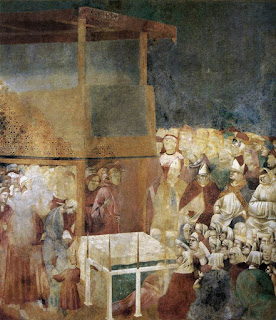4/24/2021
 |
| Giotto, "Canonization of St. Francis" |
Controversy over whether or not certain public figures should be admitted to Holy Communion is frequently disingenuous. The language of “rights and duties” can be helpful here. The Church has a duty to safeguard the MBS from profanation. The reaction to the increased risk of profanation MBS is to withhold giving it out. Then, the question “who am I to judge?” may rear its head. The judgment to withhold giving the MBS is not a penal sanction adjudicated and rendered in the moment by the minister involving the imputation of guilt upon the interior actions of the conscience of the one presenting himself or herself. Rather, it is an immediate reaction in favor of safeguarding the MBS from the danger of profanation instigated by the obstinate self-promotion of a persistent public scandal in the midst of the ecclesial community. While this is unpleasant, indeed, quite painful it is not controversial. The correct response is a simple, firm and strong refusal to give the MBS. This is not a lack of love. Just the opposite, it’s a very specific act of love intended to correct the wayward and bring him back. It is also an act of love for the remainder of the community. But, most especially, it is an act of love for Our Lord in the MBS who humbles himself to share in our humanity, with all of its scandals and obstinacy.
Back to RS. In paragraph 83 it mentions how “prudently and firmly” pastors are to correct the abuse of the faithful indiscriminately approaching the altar to receive Holy Communion. I’ll emphasize, in addition to the clear concern that too many people have very little idea what they’re doing in receiving Holy Communion, that RS puts it on the pastors to correct them. And how. With “prudence” and “firmness.” These are the two dispositions highlighted in paragraph 3 of the PCLT’s declaration on the question of Holy Communion for the divorced and remarried.